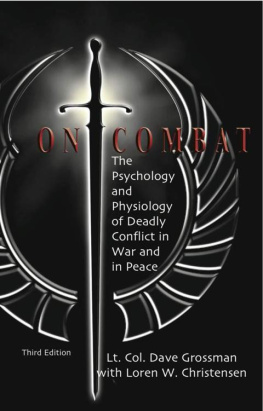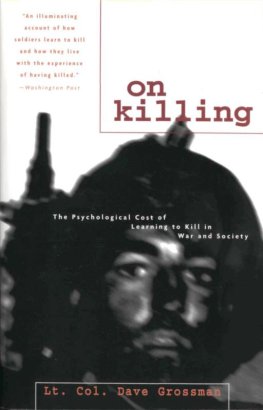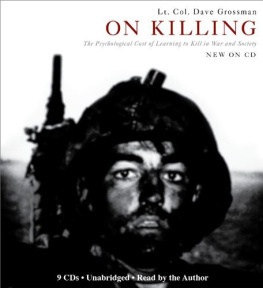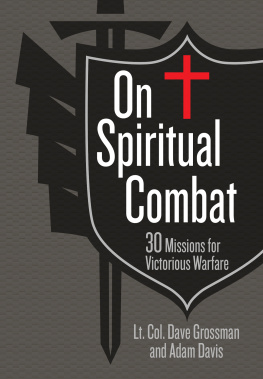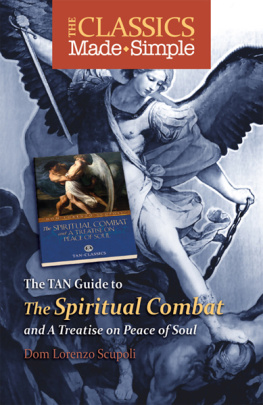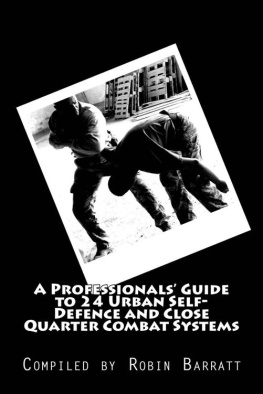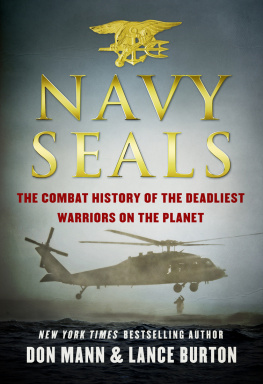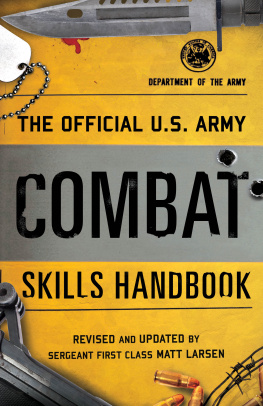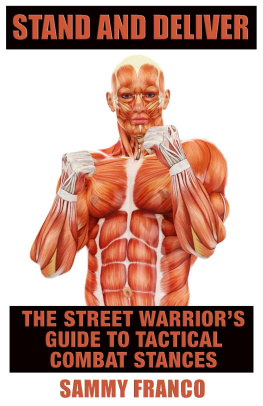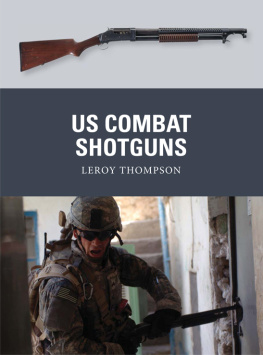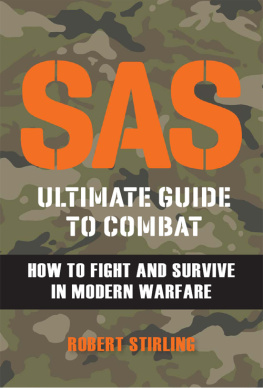Dave Grossman - On Combat: The Psychology and Physiology of Deadly Conflict in War and Peace
Here you can read online Dave Grossman - On Combat: The Psychology and Physiology of Deadly Conflict in War and Peace full text of the book (entire story) in english for free. Download pdf and epub, get meaning, cover and reviews about this ebook. year: 2012, publisher: Killology Research Group;Human Factor Research Group, Inc., genre: Romance novel. Description of the work, (preface) as well as reviews are available. Best literature library LitArk.com created for fans of good reading and offers a wide selection of genres:
Romance novel
Science fiction
Adventure
Detective
Science
History
Home and family
Prose
Art
Politics
Computer
Non-fiction
Religion
Business
Children
Humor
Choose a favorite category and find really read worthwhile books. Enjoy immersion in the world of imagination, feel the emotions of the characters or learn something new for yourself, make an fascinating discovery.
- Book:On Combat: The Psychology and Physiology of Deadly Conflict in War and Peace
- Author:
- Publisher:Killology Research Group;Human Factor Research Group, Inc.
- Genre:
- Year:2012
- Rating:4 / 5
- Favourites:Add to favourites
- Your mark:
On Combat: The Psychology and Physiology of Deadly Conflict in War and Peace: summary, description and annotation
We offer to read an annotation, description, summary or preface (depends on what the author of the book "On Combat: The Psychology and Physiology of Deadly Conflict in War and Peace" wrote himself). If you haven't found the necessary information about the book — write in the comments, we will try to find it.
Following his best selling, Pulitzer Prize nominated book On Killing, Lt. Col. Dave Grossman, with Loren W. Christensen, present On Combat, a ground-breaking examination of what it takes to perform, cope and survive in the toxicity of deadly combat as a soldier in a foreign land, and a police officer in the mean streets of urban America.
Written by two warriors who have been there and done that, On Combat looks at what happens to the human body under the stresses of deadly battle the impact on the nervous system, heart, breathing, visual and auditory perception, memory - then discusses new research findings as to what measures warriors can take to prevent such debilitations so they can stay in the fight, survive, and win.
A brief, but insightful look at history shows the evolution of combat, the development of the physical and psychological leverage that enables humans to kill other humans, followed by an objective examination of domestic violence in America. The authors reveal the nature of the warrior, brave men and women who train their minds and bodies to go to that place from which others flee. After examining the incredible impact of a few true warriors in battle, On Combat presents new and exciting research as to how to train the mind to become inoculated to stress, fear and even pain.
Expanding on Lt. Col. Grossmans popular Bulletproof mind presentation, the book explores what really happens to the warrior after the battle, and shows how emotions, such as relief and self-blame, are natural and healthy ways to feel about having survived combat. A fresh and highly informative look at post traumatic stress syndrome (PTSD) details how to prevent it, how to survive it should it happen, how to come out of it stronger, and how to help others who are experiencing it.
On Combat looks at the critical importance of the debriefing, when warriors gather after the battle to share what happened, critique, learn from each other and, for some, begin to heal from the horror. The reader will learn a highly effective breathing technique that not only steadies the warriors mind and body before and during the battle, but can also be used afterwards as a powerful healing device to help separate the emotion from the memory.
Concluding chapters discuss the Christian/Judeo view of killing in combat and offers powerful insight that Lt. Col. Grossman has imparted over the years to help thousands of warriors understand and come to terms with their actions in battle. A final chapter encourages warriors to always fight for justice, nor vengeance, so that their remaining days will be healthy ones filled with pride for having performed their duty morally and ethically.
This information-packed book ploughs new ground in its vision, in its extensive new research and startling findings, and in its powerful, revealing quotes and anecdotes from top people in the warrior community, people who have faced the toxic environment of deadly combat and now share their wisdom to help others.
On Combat is easy to read and powerful in scope. It is a true classic that will be read by new and veteran warriors for years to come.
### About the Author
Lieutenant Colonel Dave Grossman is an internationally recognized scholar, author, soldier, and speaker who is one of the world s foremost experts in the field of human aggression and the roots of violence and violent crime. Colonel Grossman is a West Point psychology professor, Professor of Military Science, and an Army Ranger who has combined his experiences to become the founder of a new field of scientific endeavor, which he has termed killology. In this new field Colonel Grossman has made revolutionary new contributions to our understanding of killing in war, the psychological costs of war, the root causes of the current virus of violent crime that is raging around the world, and the process of healing the victims of violence, in war and peace. He is the author of On Killing: The Psychological Cost of Learning to Kill in War and Society, which was nominated for a Pulitzer Prize and is required reading in classes at West Point, the U.S. Air Force Academy, police academies worldwide, and peace studies programs in numerous universities and colleges. Stop Teaching Our Kids to Kill: A Call to Action Against TV, Movie and Video Game Violence, co-authored with Gloria DeGaetano, has received international acclaim. Colonel Grossman s book On Combat: The Psychology and Physiology of Deadly Conflict in War and in Peace, now in its third edition, is on the USMC Commandants required reading list and is required reading at the DEA Academy. Colonel Grossman has been called upon to write the entry on Aggression and Violence in the Oxford Companion to American Military History, three entries in the Academic Press Encyclopedia of Violence, Peace and Conflict and numerous entries in scholarly journals, to include the Harvard Journal of Law and Public Policy. He has presented papers before the national conventions of the American Medical Association, the American Psychiatric Association, the American Psychological Association, and the American Academy of Pediatrics. He has presented to over 40 different colleges and universities world-wide. He has served as an expert witness and consultant in state and Federal courts, to include United States vs. Timothy McVeigh. He helped train mental health professionals after the Jonesboro school shootings, and he was also involved in counseling, training, or court cases in the aftermath of the school shootings at Paducah, Springfield, Littleton, Nickel Mines Amish School, and Virginia Tech. He has testified before U.S. Senate and Congressional committees and numerous state legislatures, and he and his research have been cited in a national address by the President of the United States. Col. Grossman is an Airborne Ranger infantry officer, and a prior-service sergeant and paratrooper, with a total of over 23 years experience in leading U.S. soldiers worldwide. He retired from the Army in February 1998 and has devoted himself full-time to teaching, writing, speaking, and research. Today he is the director of the Killology Research Group, and in the wake of the 9/11 terrorist attacks he is on the road almost 300 days a year, training elite military and law enforcement organizations worldwide about the reality of combat.
Dave Grossman: author's other books
Who wrote On Combat: The Psychology and Physiology of Deadly Conflict in War and Peace? Find out the surname, the name of the author of the book and a list of all author's works by series.

